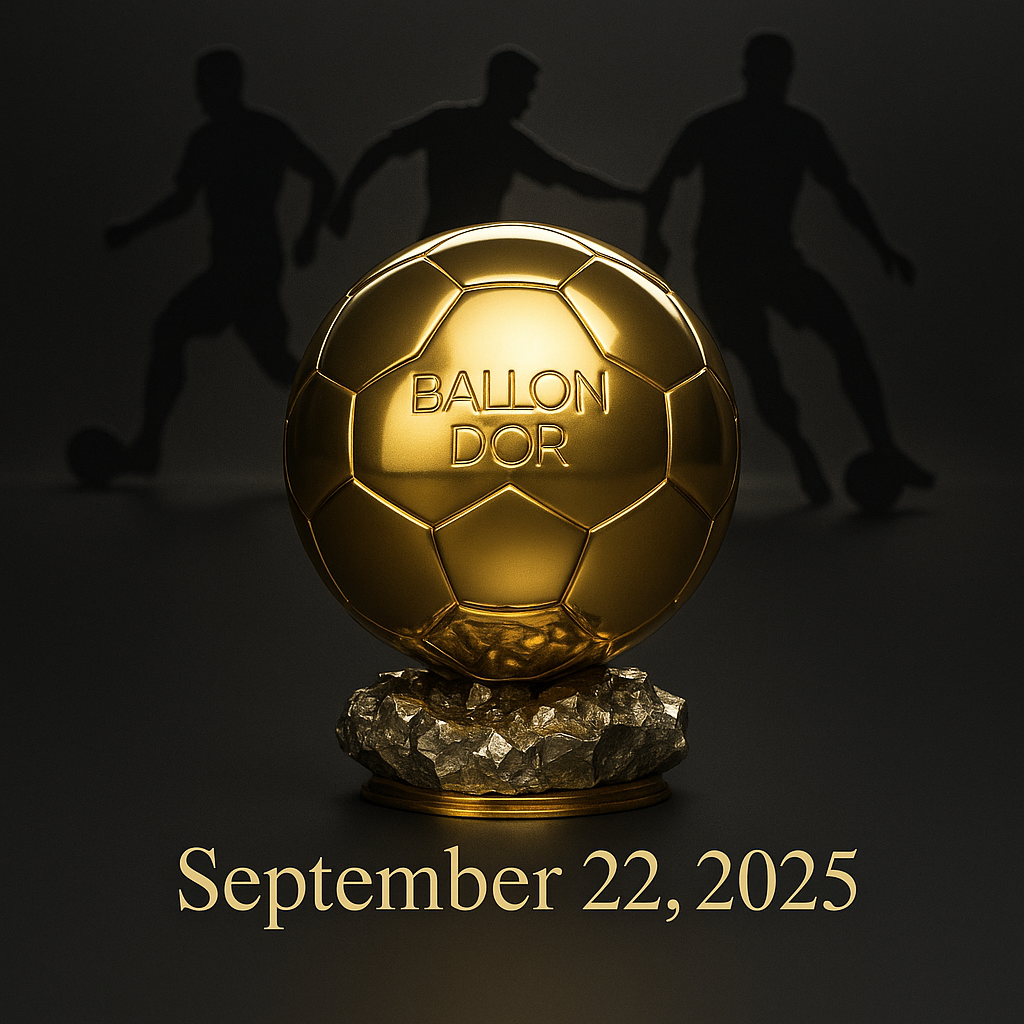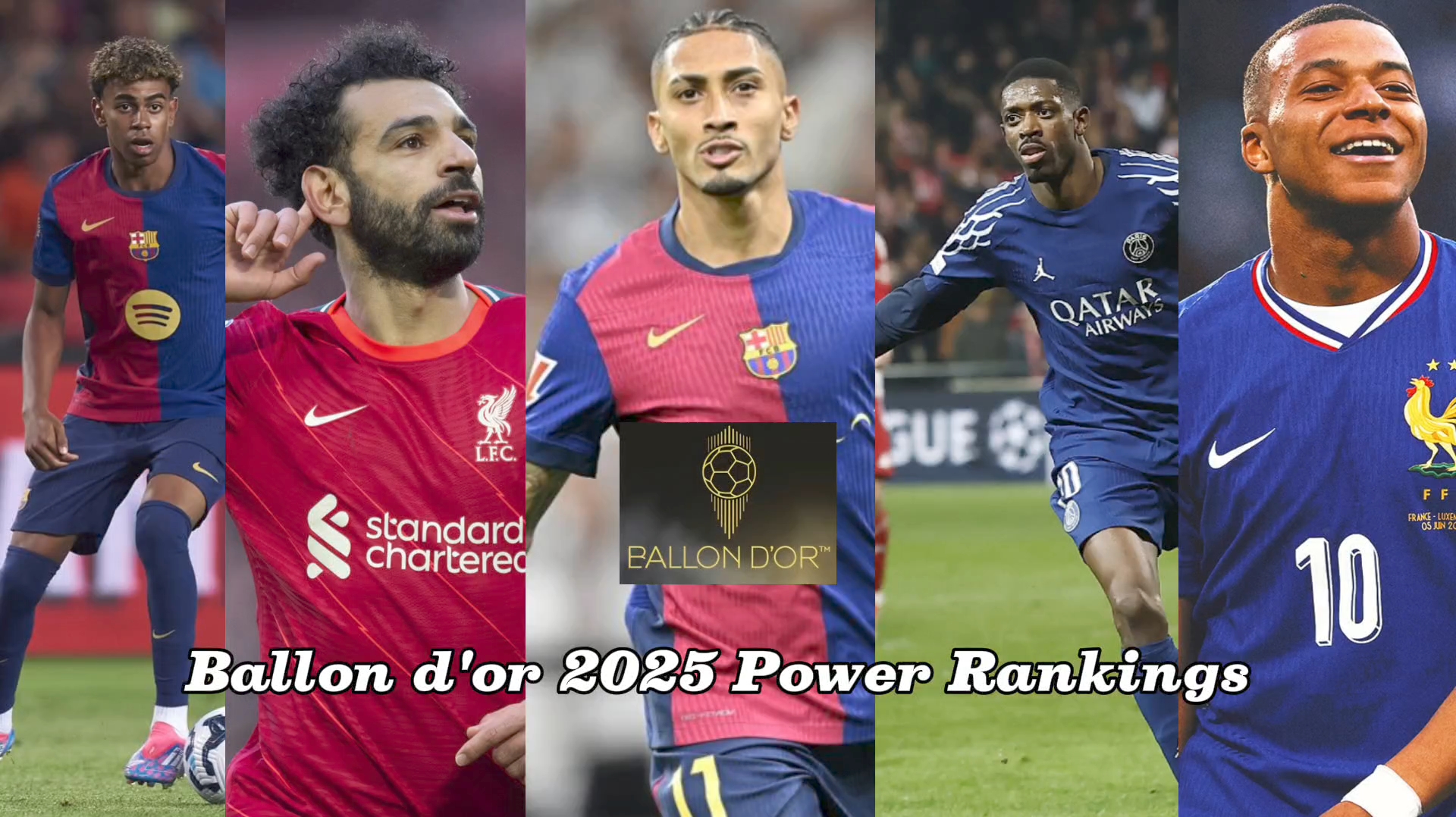The most prestigious night in football arrives September 22 as the Théâtre du Châtelet in Paris prepares to crown the world’s best player
The footballing world holds its breath as the Ballon d’Or 2025 ceremony date has been officially confirmed for Monday, September 22 at the iconic Théâtre du Châtelet in Paris. With just days remaining until the grand reveal, the debate intensifies over who will succeed Rodri as the world’s best player in what promises to be one of the most unpredictable races in recent memory.
Ceremony Details and What’s at Stake
The 69th edition of the Ballon d’Or will showcase multiple categories beyond the prestigious men’s and women’s main awards. This year’s ceremony will honor excellence across eleven different categories, including the Kopa Trophy for best young player, Yashin Trophy for best goalkeeper, and the newly expanded recognition for coaches and clubs in both men’s and women’s football.
Ruud Gullit, the 1987 Ballon d’Or winner, and British journalist Kate Scott will host the spectacular evening that celebrates the best performances from the 2024-25 season. The voting period covers performances from August 1, 2024, to July 31, 2025, making this the fourth consecutive year the award bases its judgment on the football season rather than the calendar year.
The Frontrunners: A Three-Horse Race
Ousmane Dembélé: The Championship Catalyst
Ousmane Dembélé PSG emerges as the overwhelming favorite after orchestrating Paris Saint-Germain’s historic first Champions League triumph. The French winger’s 33 goals and 15 assists in 49 appearances across all competitions represent the most complete season of his career. His 14 goal contributions in the Champions League (8 goals, 6 assists) powered PSG to their maiden European crown, culminating in a dominant 5-0 victory over Inter Milan in the final where he provided two crucial assists.
Named Champions League Player of the Season, Dembélé’s transformation under Luis Enrique has been remarkable. His leadership in PSG’s treble-winning campaign – securing Ligue 1, Coupe de France, and Champions League trophies – establishes him as the most decorated player among this year’s nominees. The UEFA Super Cup victory over Tottenham further cemented his status as football’s most impactful performer in 2025.
Lamine Yamal: The Teenage Phenomenon
At just 18 years old, Lamine Yamal Barcelona represents football’s brightest future while delivering present-day excellence. The Spanish sensation contributed 21 goals and 25 assists as Barcelona claimed their first domestic treble, winning La Liga, Copa del Rey, and Spanish Super Cup. His performances in crucial El Clásico matches and Champions League knockouts demonstrate maturity beyond his years.
Yamal’s bold declaration that he “doesn’t dream of winning one Ballon d’Or, but many” reflects the confidence of a generational talent. Should he claim the 2025 award, he would become the youngest winner in the prize’s 69-year history, surpassing even Lionel Messi’s breakthrough moment. His seamless transition from teenage prodigy to superstar makes him a compelling candidate for voters seeking to reward football’s next chapter.
Raphinha: The Record Breaker
Raphinha Barcelona mounted perhaps the strongest individual Champions League campaign in recent memory, becoming the tournament’s joint-top scorer with 13 goals while leading in assists with 9. His 20 goal contributions in Europe’s premier competition broke Lionel Messi’s Barcelona record that had stood for 13 years, establishing new standards for offensive excellence.
The Brazilian’s hat-trick against Bayern Munich and crucial goals in knockout rounds, including scoring while Barcelona played with ten men against Benfica, showcase his ability to deliver in pressure moments. Though Barcelona fell short of Champions League glory, Raphinha’s individual brilliance and record-setting performances position him as a serious contender for the Golden Ball.
The Dark Horses and Notable Exclusions
Mohamed Salah Liverpool continues his remarkable consistency with 30 goals and 22 assists across all competitions, though Liverpool’s failure to secure major silverware may limit his chances. Harry Kane Bayern Munich and Erling Haaland Manchester City bring goalscoring prowess but lack the trophy credentials of the frontrunners.
Notably absent from the nominees are Trent Alexander-Arnold, Bukayo Saka, and Bruno Fernandes, despite strong individual seasons. The exclusion of these Premier League stars reflects the increasingly competitive nature of Ballon d’Or selection.
Defending champion Rodri’s absence due to his season-ending ACL injury opens the door for a new winner, ending Manchester City’s brief dominance of the award.
The Voting Process and Predictions
A panel of 100 journalists from FIFA’s top-ranked nations will determine the winner through a comprehensive voting system. Each voter ranks their top ten players, with points allocated from 15 for first place down to 1 for tenth place. This democratic process has produced surprises before, most recently with Rodri’s victory over heavily favored Vinícius Jr in 2024.
Current betting odds favor Dembélé significantly, reflecting his Champions League triumph and complete statistical dominance. However, the sentimental appeal of crowning football’s youngest-ever winner in Yamal creates intrigue, while Raphinha’s record-breaking individual achievements provide a compelling alternative narrative.
Historical Context and Significance
The 2025 ceremony marks a pivotal moment in football’s evolution. With Lionel Messi and Cristiano Ronaldo absent from the shortlist for the second consecutive year, this award officially confirms the sport’s generational transition. The potential crowning of an 18-year-old winner would echo Ronaldinho’s emergence in the mid-2000s, suggesting football’s next superstar has arrived.
PSG’s first Champions League victory represents years of Qatari investment finally bearing fruit, while Barcelona’s domestic dominance under Hansi Flick signals their return to elite status. The ceremony will celebrate not just individual brilliance but institutional success across Europe’s biggest clubs.
The Women’s Race and Other Categories
The Women’s Ballon d’Or features strong representation from Arsenal’s Champions League-winning squad, including Alessia Russo, Leah Williamson, and Mariona Caldentey. Aitana Bonmatí seeks to defend her title against tough competition from teammates Alexia Putellas and Patri Guijarro.
The Kopa Trophy for best young player includes Yamal alongside Estêvão and João Neves, while the Yashin Trophy sees Emiliano Martínez attempting a third consecutive victory against Arsenal’s David Raya and Liverpool’s Alisson Becker.
Impact on Football’s Future
Whoever claims the Ballon d’Or September 22 2025 will inherit football’s most coveted individual prize at a transformative moment. The winner will likely influence future award discussions, tactical trends, and commercial valuations across the sport.
Dembélé’s potential victory would reward consistency and team success over individual flair. Yamal’s triumph would accelerate football’s youth movement and reshape expectations for teenage players. Raphinha’s success would highlight the importance of Champions League performances in Ballon d’Or voting.
Ceremony Viewing and Global Interest
The Théâtre du Châtelet will welcome football’s elite for an evening celebrating the sport’s finest talents. Global television audiences expected to exceed 100 million viewers will witness history in the making, whether through the crowning of football’s youngest-ever winner or the confirmation of a new superstar’s arrival.
With voting completed and ballots sealed, the football world awaits the moment when France Football reveals the 2025 Ballon d’Or winner. September 22 promises to deliver drama, emotion, and the continuation of football’s most prestigious tradition.
The stage is set, the nominees are ready, and football history awaits its next chapter at the Ballon d’Or 2025 ceremony in Paris.


